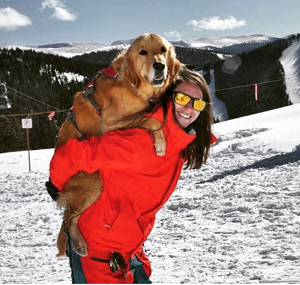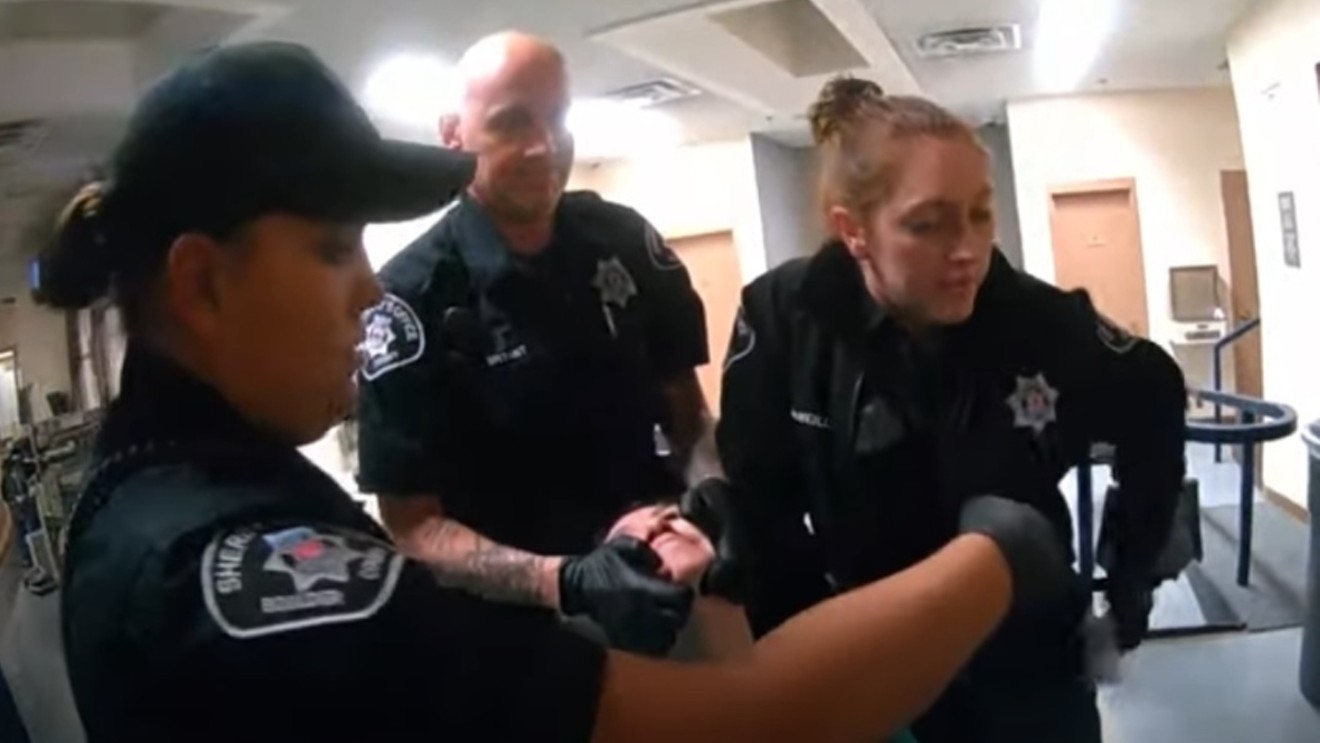The Boulder County Sheriff's Office, which staffs the jail, initially denied any improper actions. But that changed yesterday, September 24, when the BCSO announced a $400,000 settlement with Gotthelf that includes several procedural changes, including a prohibition against tasing anyone in a restraint chair and greater involvement of mental health professionals.
"Lauren's number-one priority in bringing this case was to make sure that no other person suffered the same indignity that she had," says attorney Mari Newman of Denver's Killmer, Lane & Newman, LLP, who represents Gotthelf. "She was very committed to ensuring that significant policy changes were a key part of resolving the case."
According to Newman, "Lauren was arrested on the Pearl Street Mall for allegedly smoking a cigarette and walking her dog without a leash." Sage, Gotthelf's service dog, "was ripped away from her, and while Lauren was in a holding cell, Boulder jail personnel claimed she made a suicidal statement. But instead of treating her with any sort of compassion or humanity, they demanded that she strip naked — and when she balked at that, they went into her cell, forcibly extracted her and shoved her into a restraint chair."
Once Gotthelf had been strapped down, Newman continues, "they inflicted multiple types of force on her, including a hypoglossal hold around her throat and jaw and multiple different kinds of pain compliance techniques. Even while she was restrained, they tased her in the upper thigh. It was absolutely inhumane, as well as unconstitutional. They then left her sitting in a cell strapped in the restraint chair with a spit hood over her head for hours."
And the action was captured on video:
Newman filed a lawsuit on Gotthelf's behalf in November 2019, naming the City of Boulder, Sheriff Joe Pelle and eight jail employees as defendants. In response, the Boulder County Sheriff's Office released a "Statement Regarding the Use of Force Lawsuit from Lauren Gotthelf."
In the document, the BCSO maintained that "when Ms. Gotthelf arrived at the Boulder County Jail, she was disruptive and was placed in a holding cell. Staff tried to deescalate her behavior, but Ms. Gotthelf was argumentative and unrelenting. She refused to comply with repeated commands from two separate deputies. When deputies attempted to take her arm to escort her to a cell, she sat down and refused to move. When the order was repeated she got up, walked about ten feet from the holding cell and stopped. She planted her feet and braced her legs to prevent movement. She was wearing socks and deputies had to slide her across the linoleum floor into the cell because of her resistance and refusal to move."

Lauren Gotthelf with her dog, Sage.
Family photo via Killmer, Lane & Newman, LLP
The BCSO's denials didn't surprise Newman. "From the beginning, the sheriff's office did what sheriff's offices always do: They circled the wagons and declared they hadn't done anything wrong," she says. "So I'm happy that the Boulder sheriff's office has acknowledged that changes needed to be made and then made those changes."
A sheriff's office release reveals that the $400,000 settlement was reached on September 21. "As a result of the lawsuit, Boulder County has re-evaluated its policies," the release notes, explaining that it has altered its protocol as follows:
• Prohibiting the use of a CED [a conductive energy device, also known as a taser] by a deputy while an individual is restrained in a restraint chair;In Newman's view, the video shows precisely why these reforms were necessary. If the officers "truly believed Lauren was suffering from a mental health crisis, this was the exact opposite way that a humane and compassionate government would treat a human being."
• Requiring consultation with jail mental health staff before using a restraint chair to restrain a detainee, where possible;
• Requiring the presence of jail medical or mental health staff to evaluate the need for suicide protocols regarding a detainee before implementing suicide protocols, where possible;
• In-person mental health services will be available for detainees at all times (except that during the COVID pandemic, they may be provided through Telehealth means during nighttime hours); and
• Additional mandatory training of deputies on these changes in policy, including de-escalation and treatment of inmates and detainees with mental health concerns.
That Boulder went from declaring its innocence to admitting that it erred in less than a year qualifies as a relatively rapid response, given the slow pace at which the justice system typically operates. The turnaround time could suggest that officials realized the footage of Gotthelf's treatment would prove so shocking to any jury that capitulating was the only option, but Newman isn't so sure.
"Very often, we're forced to litigate egregiously outrageous cases for years and years," she allows. "Who's to say why a defendant ultimately resolves a case? But I'm glad Boulder did the right thing here."
Click to read the amended complaint in the case of Lauren Gotthelf v. Boulder, Colorado, et al.












